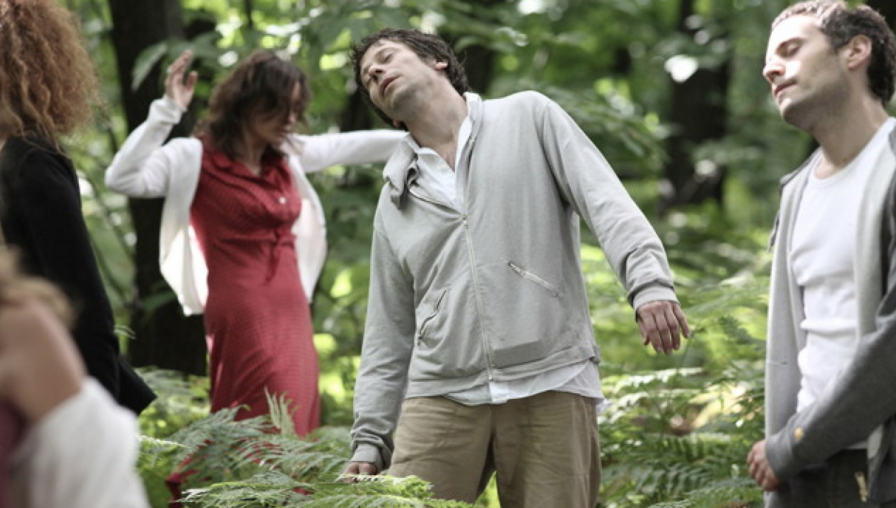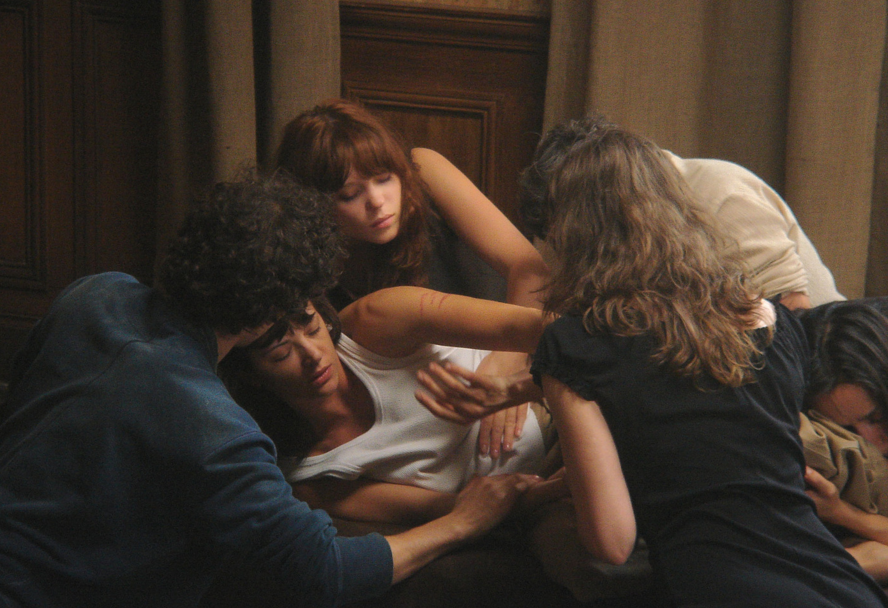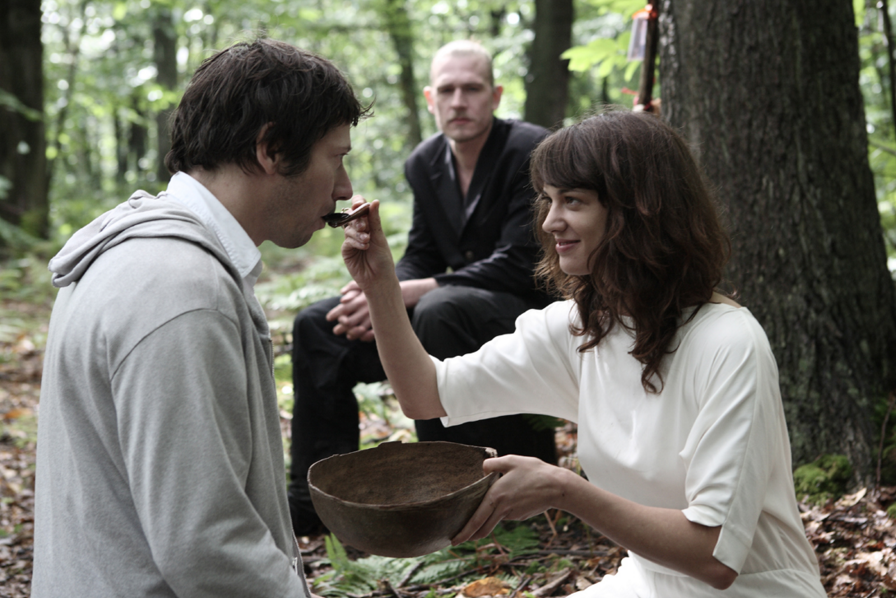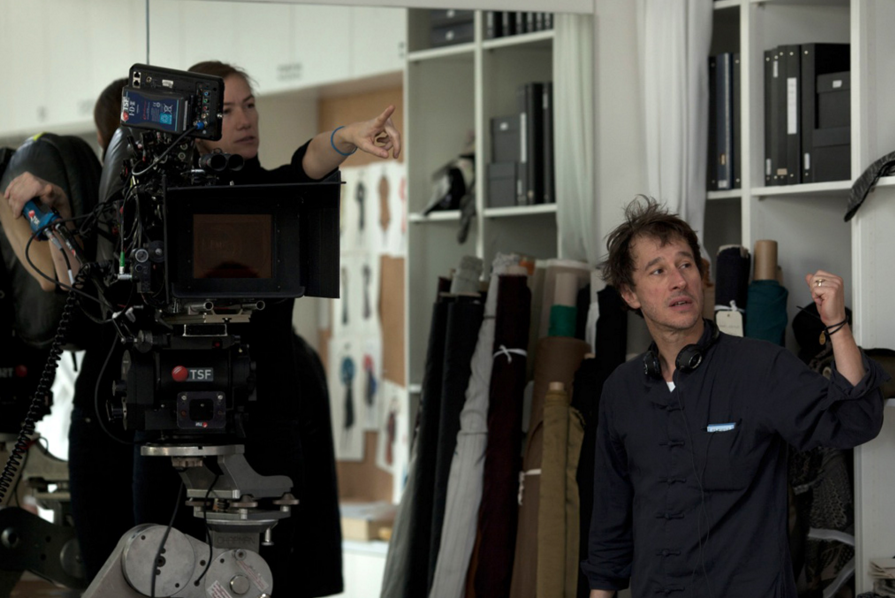Starting with 2011’s House of Pleasures, Bertrand Bonello has been on the verge of some sort of breakthrough, but it’s telling that this is the most obvious starting point — it’s the only one. That was essentially the first project to got any real U.S. distribution, and its appreciation, while fervent, remains hermetic, while the attention paid to this year’s Saint Laurent wasn’t exactly significant. (This, I should stress, is in no way a reflection on their quality.) The very small release being granted to On War some seven-and-a-half years after its debut probably won’t launch him much further, thus all the more reason why it’s a work — familiar in its archetypes, entirely unique in its approach, and difficult to shake after the fact — in need of attention.
I got in touch with its U.S. distributor, Indican Pictures, who put me in touch with Bonello for a phone interview between Paris and New York. Although it’s initially clear that the writer-director hasn’t thought much of the film in years — to say nothing of the revelation the he doesn’t much admire his own work — the specificity of its vision, and of his way to approach cienma, becomes clear as we get deeper into our discussion. I did, of course, have to end with a question about his next feature, Paris Is Happening, which concerns young terrorists in the city and, needless to say, has gained an unfortunate significance in the last month.
The Film Stage: Could you give us some background as to why this film is only now being released in the U.S.?
Bertrand Bonello: No. I really don’t know. [Laughs] The film was released in France, like, seven years ago. Earlier this year, Saint Laurent was released in the U.S., and, you know, the attention was maybe getting a little bigger, and maybe a distributor looked at my former films.
There was a retrospective in New York and Saint Laurent opened up the conversation a bit, but your work is pretty badly distributed here.
I know.
Do you have any idea why? Have you asked yourself this question?
Well, it’s not that easy for French films to travel. We are doing, like, 240 films a year, and not all of them travel — especially in America, which is a difficult country. I guess the first one that was really released would be House of Pleasures, probably also because of the competition in Cannes; that put some light in the film. When the film was shown in Cannes, it went pretty well, so maybe it helped the distributor to make his decision, to bring the film to the U.S. After that, Sony was interested in what I was doing, and they bought Saint Laurent before they saw it, just before the festival. But, before that, I know my films were quite “confidential” in foreign countries, yes.
Has this release made you consider the movie again? Has it been on your mind more in recent months? Maybe even rewatched?
For me, it doesn’t change a lot. I just keep on working the way I always did. Films are getting a little bigger — I have some more money — but I try not to change the way I think and the way I do movies.
Is there any habit of revisiting your work?
Not a lot. I’ve done it recently because I’ve had quite a few retrospectives, so I had to watch some again to prepare them and prepare the Q & A — stuff like that — but, for me, when it’s done it’s done. I try to look beyond, to the future, more than to the past.
I think the film quickly announces certain, let’s say, “intentions,” if only because Mathieu Amalric plays a film director named Bertrand. But there are other, bigger things, e.g. this director owning a poster for your film Tiresia; at one point, he has a nightmare in the form of its most horrifying scene; and the movie’s actor, Laurent Lucas, also appears. You also make a very peculiar cameo at the end of Saint Laurent. Why, if at all, do you like inserting yourself into your own movies?
Well, first of all, I think if I call the character Bertrand it’s because it gave me more freedom. I’m not afraid to treat myself badly, you know? If I had called the character, like, Pierre or Jean, maybe I would have been more respectful. With my own name, for me, it’s easy, and it gave some humor to some of the stuff. For example, with the poster of Tiresia and how it becomes a nightmare: because, in a way, for me, the nightmares are my former films. That’s why I don’t like to look too much into the past, but toward the future. But you’re always living with the films you’ve done. Here, you live with them, and it’s not always so easy.

Do you ever consider people making inferences about you? Perhaps thinking you have an idea of who you are as a result of the character?
Not that much. The fact that the character has my name is just, like, a small part of the film, you know? I hope the film can be seen even if someone doesn’t know my previous films or anything. The character is a director — as in many, many films in the history of cinema. It’s a very familiar character, the director, because it allows you to talk about your anguish, about creation, about your life — not really mine, but everyone who makes films, or art’s, life.
Are you not happy with Tiresia?
What I’m very happy with is a short film with Asia Argento called Cindy: The Doll Is Mine, which is based on Cindy Sherman’s work. It’s fifteen minutes, but I’m really happy with it. The other films… you know, I always think a film is the result of what you were able to do and what you were not able to do. That’s what makes the film. So, of course, you are disappointed, but the disappointment is part of a film. So it’s a strange feeling, but that’s the way it is, and I really accept it.
Is the disappointment a way of applying something to your next film? Are you always trying to ensure that it doesn’t creep in again?
Oh, yeah. Yeah, yeah. You try, when you move on, to say, “Okay, the other one, I missed that. On this one, I will make it.” All the mistakes, you try to avoid them on the next film — and, of course, you don’t, because part of your mistakes is also your style. It’s inside you. It’s just not a mistake; it’s just who you are. Some part of who you are, you don’t like. Some you do, and some you don’t. But that’s who you are, and that’s what your films are.
Your films tend to be very claustrophobic, and this is no exception, from Bertrand being locked inside a coffin to the strange colony in which much of the action is set.
It’s very true, yeah, and even the next one, it’s the same: it takes place in a mall. I really like these flirtations, you know? To make a film, or 75% of a film, in one unique place. That means it’s cut out from the outside, cut out from reality, because then your characters are also cut out from reality. It allows you to have a lot of fantasies. For me, these places, they are like movie theaters. When you come into a movie theater, there’s no windows — no relationship with the exterior, with the outside — and you’re ready to receive a film or fantasies or ideas. It’s exactly like a brain, and that’s why I really like writing and directing these films in one unique location, cut from the outside: it gives you a lot of possibilities, a lot of freedom. Like a brain.

The soundscape plays a major part in establishing On War’s tone. The score, in particular, is this droning piece, and its interaction with the images — such as a trance sequence — makes me wonder where you start with music. Do you compose first and then apply, or is there more interplay?
Usually, I try to compose the music while I write the script. If I write a scene and I think there should be some music, I have a record and I really try to put it in the script — which record is it, when it starts, when it ends. Or it’s original music, and I start to compose it and to record it. Usually, when I finish the script, the score is finished. For me, the music in films is exactly like a script: it’s supposed to say something. It’s not just an illustration of the meaning. It’s as important as the script itself, and I do them at the same time.
Do you play your music for actors?
Usually, what I do is make CDs for the actors with the music of the film, but also with some other music. For example, for Mathieu, I chose, like, ten or fifteen songs or pieces that remind me of his character, and I do a compilation and give it to him. And I do another compilation and give it to Asia, or give it to Guillaume. All the characters. I ask the actors to listen to the music once a day for the last month before the shoot, for example. For me, it’s much more useful than talking to the actor about their character. You don’t need to use words; everything is in the music. You don’t use the music during the films, but they know it, you know? Sometimes, before a take, you tell them, “Remember this song. This is the mood of the scene,” and it’s very efficient. Much more than psychological indications.
There’s a mystery to this colony where Bertrand visits, with mere hints giving us a history. Do you have full portraits in mind, or are profiles as scant for yourself?
It’s always a mix of who the actor is and what I’m writing. For example, I really wrote the film for Mathieu, Asia, and Guillaume. So, for Asia and Guillaume, I know who they are — what they’re going to bring, what kind of energy, how they’re going to say the words — and that’s about fifty percent of the character. The other fifty percent is my imagination, my fantasies. But I really wrote the film for them. It’s people that I knew very well, so it’s very much part of the writing: it’s the fact that I know the actors for this film.
Talk a bit about Mathieu Amalric. He’s pretty well-tuned for this role: his facial expressions and gestures and tone of voice tell us as much as what’s on the page.
Well, to be honest, if Mathieu turned down the film, I wouldn’t have done the picture. It was him or no one. We’ve known each other for twenty years, and, for twenty, people always told us that we really look alike. I think it was before that he did a film for television, with a character inspired by himself, and he wanted me to play it. I didn’t do it, because I was a little afraid of doing an imitation of him. But when I asked him if he would do this film, he was a little more generous than I was and said yes. But, if he had said no, I couldn’t have replaced him, I guess.

There’s a point in the movie where he watches eXistenZ, and the climax directly homages Apocalypse Now. In the end credits, you thank Cronenberg and Coppola for their assistance. What’s the story behind this?
Oh, yes. When I asked the authorization of using eXistenZ to David, he said, “Yes, of course. You can take it for free.” Then we asked to Francis’ production, the rights to use the voice of Marlon Brando, and they said, “Yes. It’s free.” It was very, very nice of them.
I have to ask about the current state of Paris Is Happening. Where are you with it?
It’s a little complicated. I’m editing the film, which is about young people putting bombs in Paris — so it’s very weird, these days, to work on the editing. So, yes, it’s a very contemporary film. I’m working on the editing; I showed a version today, for the first time, to the producers, but it’s a little weird to work on that in Paris these days.
Has there been any hesitance from producers, financiers, or the like, given recent events?
Well, we’re trying to keep on working without doing any relationship with reality — to keep working on the film, on the feature, the fiction. Even if there are some things that are really the same, there are also some that are very different. We have to separate those and just keep on working, and see in a few months, when the film is finished.
Even with what you’ve said, have you felt your relationship to the work change at all?
Myself? Well, of course we are living in fear — but, at the same time, we have to keep on living. I don’t want to leave Paris or to hide or to be scared. It’s just a major, major question of the 21st century. We are very shocked, of course, but we have to be strong and keep on working and living and having fun. I don’t want to change my life because of the fear in the city — which is very strong these days, you know?

On War will enter a limited theatrical release on Friday, December 4.
